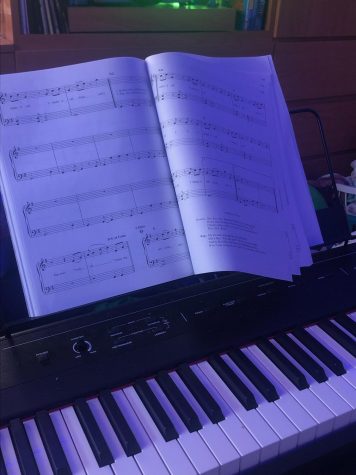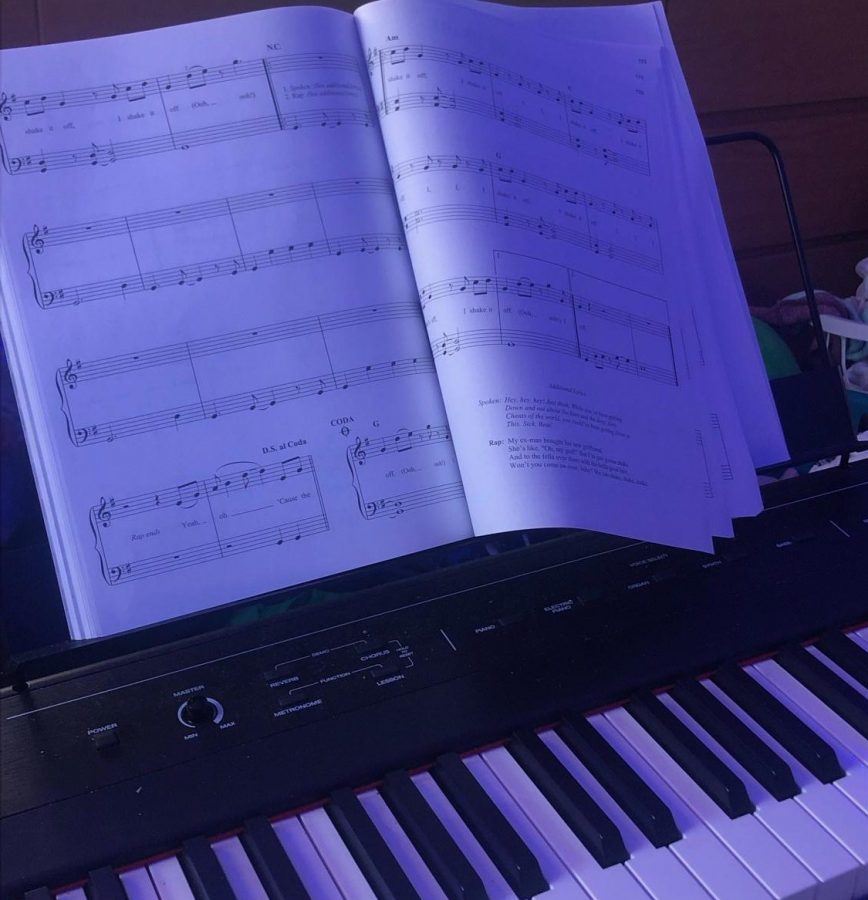Face The Music
September 28, 2021
A debate that’s been going on for decades is if schools should promote music education to their students or even offer it. While everyone has their own opinions on this matter, allowing students to take music classes in school is very beneficial for them and their education.
So why is music important to students as a whole? Music helps develop good memory. The melodies and sounds help so that we can remember lyrics even if we haven’t heard the song in years. We can use this as a tool to remember other things by listening to educational songs like the states song, the pi song, or even the alphabet. This skill becomes even more prominent when playing music because you have to remember notes, chords, dynamics, and more. This means that by taking music classes, your students will be able to gain memory skills that they can then use in their academic classes.
It’s also really important for small children because music provides lots of words in a small amount of time, so it helps kids expand their vocabulary and strengthen their language skills. Not even just their own language either! Music from different languages and cultures can provide children a pathway into learning different languages. Students can learn about other cultures through music by listening to their music, learning how they play it, and hearing the stories behind it. This will lead to an overall sense of acceptance and a want to learn more. It also is a way to bond with others because no matter the lyrics, there is always a beat to bond through.
If music can help just by listening to it, why would schools want to waste money on expensive instruments when they could just encourage students to listen to it on their own? On top of the benefits of just listening to music, playing it has benefits of its own. Playing music in groups in schools can help encourage teamwork because in order for a song to truly sound right, everybody’s part needs to be right. You can’t have the full song without all the instruments.
Since everyone is listening to each other, students also have to learn how to listen to the thoughts, opinions, and critiques of others in order to improve their music and have a great sound.
Music classes are strongly based on working together, which means that music creates friendships that can last a lifetime. In music classes, classmates can bond over their love of music and can help each other develop their skills. During classes and performances they’ll share feelings of excitement, frustration, nervousness, and more. These friendships can also encourage students to be competitive with each other and engage more in school.
Music classes develop many skills which help students in academic classes too. For example, students can learn better listening skills by studying music. They have to listen closely to the sounds of their instruments and to those around them to make sure everything sounds correct. It also gets students more involved into the rest of their school day. Students look forward to music classes, which gets them to look forward to school in general and engage more in other classes. The music classes relieve stress in students so that they can go to their next class recharged and will be able to perform better than before. SCL Health even says, “Research has found that when a subject listens to music that gives them the chills, it triggers a release of dopamine to the brain.” Meaning that not only are students’ stress levels going down, their happiness levels are actually going up.
Musicians must also have good hand-eye coordination, be able to multitask, and have good discipline. They have to continuously practice their instrument in order for it to sound good. This teaches them good work ethic and discipline, which can continue to be practiced in the rest of their classes. You can use these skills when applying to the workforce, even if your career is not in music. Your good work ethic will help you stay on top of tasks, try your hardest, and bring positivity into the workplace.
For those who aren’t succeeding academically, it grants them an opportunity to be successful at something else. A student can be poor at academics and a prodigy in music. This will promote the student’s confidence and encourage them to try harder in different classes.
Students can also learn about other cultures through music. By listening to their music, learning how they play it, and hearing the stories behind it, you’re introducing them to a whole new world. This will lead to an overall sense of acceptance and a want to learn more. It also is a way to bond with others because no matter the lyrics or what language they’re in, there is always a beat to bond through.
Some may argue that teaching music costs a lot of money and it’s hard for lots of schools to be able to afford it between the costs of instruments, venues, sheet music, music teachers, and more. While music might be expensive, the look on a child’s face when they finally get that scale right or master that groove is priceless. There are so many benefits that are worth a little money. Besides, you don’t need to go out and buy every instrument to ever exist, you can start out small and gradually add to your collection.
Others might argue that if students are spending a lot of their time working on their musical abilities, that it will distract students from their academics and cause their grades to slip. Music education actually encourages students to go to school and listen. Music can promote great reading skills, listening skills, and more. Besides, students need a bit of a break from academics everyday to do what they love so they don’t burn out.
Another reason why lots of schools and parents are against music in schools is because in lots of music programs, students will compete for things like first chair or solos and when a student doesn’t always get the top spot, it can cause them to lose confidence. Although when you think about it, competition is part of sports as well, but people aren’t actively trying to get rid of those. Also if someone doesn’t get that top spot, who’s to say it won’t motivate them more? It might motivate them to go home and try harder so that they can be the best next time.
When asked, students in music education all agreed that there are definite benefits to taking these classes in school. Ella Gillam, an orchestra student at an American high school, went on to say, “They [music classes] can help teach your brain to work in different ways. Such as being able to stay in sync with a group, the ability to multitask by playing and watching the conductor at the same time, and the ability to move quickly and on que which can help with dexterity and body awareness.” Vani Mehta, a student in her school’s band, remarked that, “It opens another part of your brain.” Meaning that music is an opening to a whole new world for her and others, and without it she feels she’d be missing a piece of her.
Some even go on to argue that if music is something you’re truly passionate about, it could be more important than core academic classes. “Music wields many benefits that a core academic class may not offer. For example, music can teach people to work together, to listen, to be in harmony, and, to many people, express themselves and communicate,” Gillam communicated to me, “Personally, music doesn’t affect me that much so I’m inclined to say core classes are still more important, but that’s just in regards to myself. To some people music is their lifeline, and that shouldn’t be diminished.” Addy Calhoun, a marching band member, brought up that if someone says they’re passionate about another subject or a sport, we tend to take them seriously, so why wouldn’t we do the same for a music class?
Others say it’s more dependent on your circumstances. Mehta argues that in certain schools she’s been to, music is a lot more important, but in her current school the music classes have the same value to her as the academic ones. Joseph Strom, a Greenwood orchestra student, says that while he values music classes, he values academics more. He believes that unless you’re the next Motzart, academics will provide you with more skills for future careers and get you further in life. Rowan Bullington, a high school piano student, says that it depends on your personal interests. If you want to be a famous cello player, then yes they should be valued more than your core classes, but if you want to be an engineer, a math class would definitely have more value. She argues that, with all classes, it’s about finding something you’re truly interested in as an individual, so she can’t just give a blanket answer for everyone.
When asked about why they love these classes, the students brought up tons of things that keep them coming back. Mehta and Calhoun agreed that the community was amazing and that playing music really brought them together. Gillam told me about how she loves being able to do hands-on activities instead of just sitting around and listening to teachers try to explain the reasoning behind everything. Bullington even said that she enjoys the technical things that others might find boring. Meanwhile Strom just loves playing in general. Most agreed that they just love learning new things and being able to play for others. In fact, most students’ least favorite part of the class is repeating basic things because they love advancing and learning as much as they can about their instruments.
Ultimately, music classes provide many benefits to students and there’s no good reason to not offer them. While they don’t have to be required, every student will greatly benefit from at least one aspect of music education within their school.
The Importance of Music Education in Schools – Graduate Programs for Educators. (2020). https://www.graduateprogram.org/2020/08/the-importance-of-music-education-in-schools/
Negatives of Music in School | Synonym. (2021). https://classroom.synonym.com/negatives-music-school-8136295.html
How Listening to Certain Songs Can Impact Our Brain and Affect Our Mood. (2021). https://www.sclhealth.org/blog/2019/04/how-listening-to-certain-songs-can-impact-our-brain-and-affect-our-mood/#:~:text=Research%20has%20found
J. Strom, Greenwood Orchestra Student, September 9, 2021
V. Mehta, Student In Music Education, September 14, 2021
A. Calhoun, Student In Music Education, September 14, 2021
E. Gillam, Student In Music Education, September 14, 2021
R. Bullington, Student In Music Education, September 14, 2021





Ella • Sep 29, 2021 at 6:17 pm
Interesting perspective